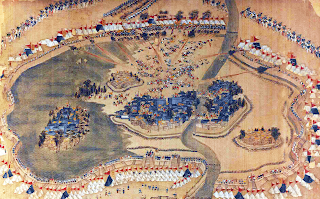Wee Kek Koon
South China Morning Post
February 27, 2022
- Some cults in ancient China became so powerful they grew into political and military forces, and launched armed rebellions against the state
- The most recent nation-shaker before the 20th century saw its founder, who claimed to be Jesus’ younger brother, lead 10,000 followers against the Qing dynasty
I recently watched a deeply unsettling docuseries, Stolen Youth: Inside the Cult at Sarah Lawrence (2023).
The series documented a group of students at New York’s Sarah Lawrence College, and the sisters of one of them, falling under the spell of a classmate’s father in the 2010s, and being psychologically and sexually abused by him for close to a decade.
Recorded video and audio footage of abuse showed Lawrence Ray manipulating his obviously intelligent victims – one of them was a medical doctor who had recently graduated from Harvard and Columbia – to the point that they lost all sense of reality, cut off all ties with their family and friends, and became totally and helplessly dependent on him.
A cult includes some or all of the following characteristics: authoritarian control, extremist beliefs, isolation from society, and the veneration of a person or persons.
Today, the definition of cults has broadened to include groups that are non-religious in nature, such as the one depicted in Stolen Youth, but in the past they typically referred to groups that professed some kind of non-mainstream religious beliefs.
There must have been countless religious cults in China given its long history and its territorial and population size, but almost the only ones that got any mention in historical records were those that became sufficiently powerful to threaten the regime of the day.
One of the earliest religious cults to grow into a political and military force was the Taiping Dao, or Way of the Great Peace.
Its leaders were Zhang Jue and his two brothers, who were venerated as sorcerers and healers by their followers, which numbered in the hundreds of thousands all over China.
Zhang Jue launched his armed rebellion against the Eastern Han dynasty in AD184. Known in history as the Yellow Turban Rebellion after the headgear of the rebel troops, the revolt was eventually put down after a few years, but the Eastern Han was so severely weakened that warlords tore it apart and the dynasty fell in 220.
In the Tang dynasty, a woman named Chen Shuozhen, who claimed to be immortal, led an armed rebellion against the local government in 653.
She even proclaimed herself the Wenjia Emperor, making her the first woman in Chinese history to bear the title huangdi, a full 37 years before Wu Zetian, the only officially recognised “female emperor” in China, took on the title in 690.
Chen’s rebellion lasted only a month before her troops were routed by government forces. She was most likely killed in battle but many of her followers believed that she escaped death and ascended to heaven like an immortal, or survived and lived incognito among them.
The most recent cult that shook the nation before the 20th century was the Bai Shangdi Hui, or God Worshipping Society, a syncretic form of Christianity founded by Hong Xiuquan, who claimed to be Jesus Christ’s younger brother.
In 1850, Hong led around 10,000 followers in an armed rebellion against the Qing dynasty and founded the Taiping Heavenly Kingdom, a theocracy with him as the supreme ruler.
The Taiping Rebellion grew to such an extent that the Heavenly Kingdom occupied almost all the territories south of the Yangtze River at various stages of the rebellion.
When the final remnants of the Taiping army were defeated in 1871, the Qing dynasty, having been pummelled by foreign aggression and domestic strife, was well on its way to its eventual demise.
As I was watching Stolen Youth, I kept asking myself if I could fall under the spell of charismatic cult leaders like Lawrence Ray, or for that matter, Zhang Jue, Chen Shuozhen and Hong Xiuquan. I hope I never have to find out.
Wee Kek Koon
Having lived his whole life in the modern cities of Singapore and Hong Kong, Wee Kek Koon has an inexplicable fascination with the past. He is constantly amazed by how much he can mine from China's history for his weekly column in Post Magazine, which he has written since 2005.
https://www.scmp.com/magazines/post-magazine/short-reads/article/3211448/how-powerful-ancient-chinese-cults-threatened-regimes-day-and-even-hastened-end-dynasties


No comments:
Post a Comment